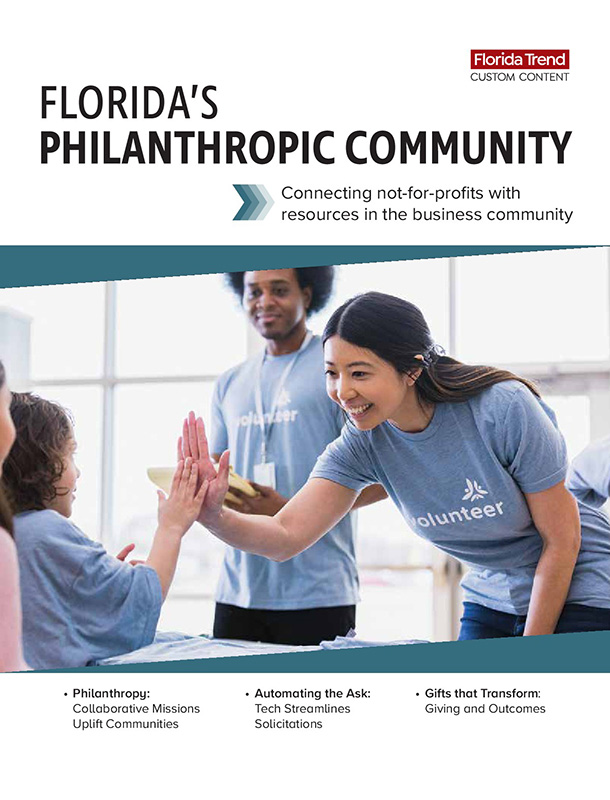SHARE:
Non-Profits
Blood Work
In four years as CEO, Anne Chinoda has doubled the size of Florida’s Blood Centers. Now she faces a series of challenges, including younger donors who don’t give like their parents.
Each day, hospitals in Chinoda’s service area require nearly 1,000 units of blood. Meeting that demand starts with getting nearly 1,000 people a day to walk into one of her 38 donor centers or 44 blood mobiles and offer up a vein. They have to do it for free — U.S. Food and Drug Administration rules dictate that transfused blood come from unpaid donors. (“Plasma center’’ operations that pay donors typically sell the plasma to biotech or pharmaceutical companies for research.)
Part of Chinoda’s challenge in reaching those numbers is that the World War II generation of frequent donors is dying off. Baby Boomers are good donors, Chinoda says, but “they don’t match up to their parents,” which is why Florida’s Blood Centers’ marketing strategy now includes encouraging younger people to become donors through blood drives at high schools, community colleges and universities. Another issue: Cultural influences. African-Americans and the fast-growing Hispanic population don’t give blood as frequently as Anglos. Yet another: More groups that are excluded for health concerns. For example, anyone who lived in a country when mad cow disease was found is not eligible to donate. And anyone who has even visited a country where malaria was reported must wait 12 months before donating.
Those donor trends, plus a 5% to 7% annual growth in demand for blood statewide, add up to tight blood supplies in Florida. The state, according to the FDA and the U.S. Department of Health and Human Services, is supposed to have a three- to five-day supply of blood on hand, but the reality is that there’s usually only a one-day supply — 3,000 units — in reserve. “There are times when we are literally working on a just-in-time inventory system,” she says.
Chinoda also has to deal with increased overhead caused by increased testing. During its 18-hour journey from donor to hospital, blood is sorted by type and then tested for a battery of diseases, including HIV, hepatitis, syphilis and viruses, including the West Nile. Alicia Bellido Prichard, president of the Florida Association of Blood Banks, says more tests are coming. This year, for example, Florida’s blood banks are phasing in testing for chagas, a parasitic disease of the blood becoming more common in Brazil, Bolivia, Argentina, Central America and Mexico. Nationally, the cost of testing each unit of blood has risen 70% in the last five years.
The bottom line for hospitals that buy blood from community organizations is that the cost is going up. A 2005 study by the American Association of Blood Banks found that the cost per unit rose 30.8% from 2001 to 2004. On average, it costs Chinoda’s operation $285 to procure, test and distribute each unit of blood.
Joe Brown, a spokesman for Orlando Regional Healthcare, which owns five hospitals in Florida’s Blood Centers’ territory, says hospitals don’t have a lot of options. “You can’t operate without blood,” Brown says. “It’s not like we can boycott or picket or stop doing hospital work.” But Brown says the bigger issue, from a hospital’s point of view, is always having enough blood — and Florida’s Blood Centers has “always come through” when one of his hospitals needed blood.






















